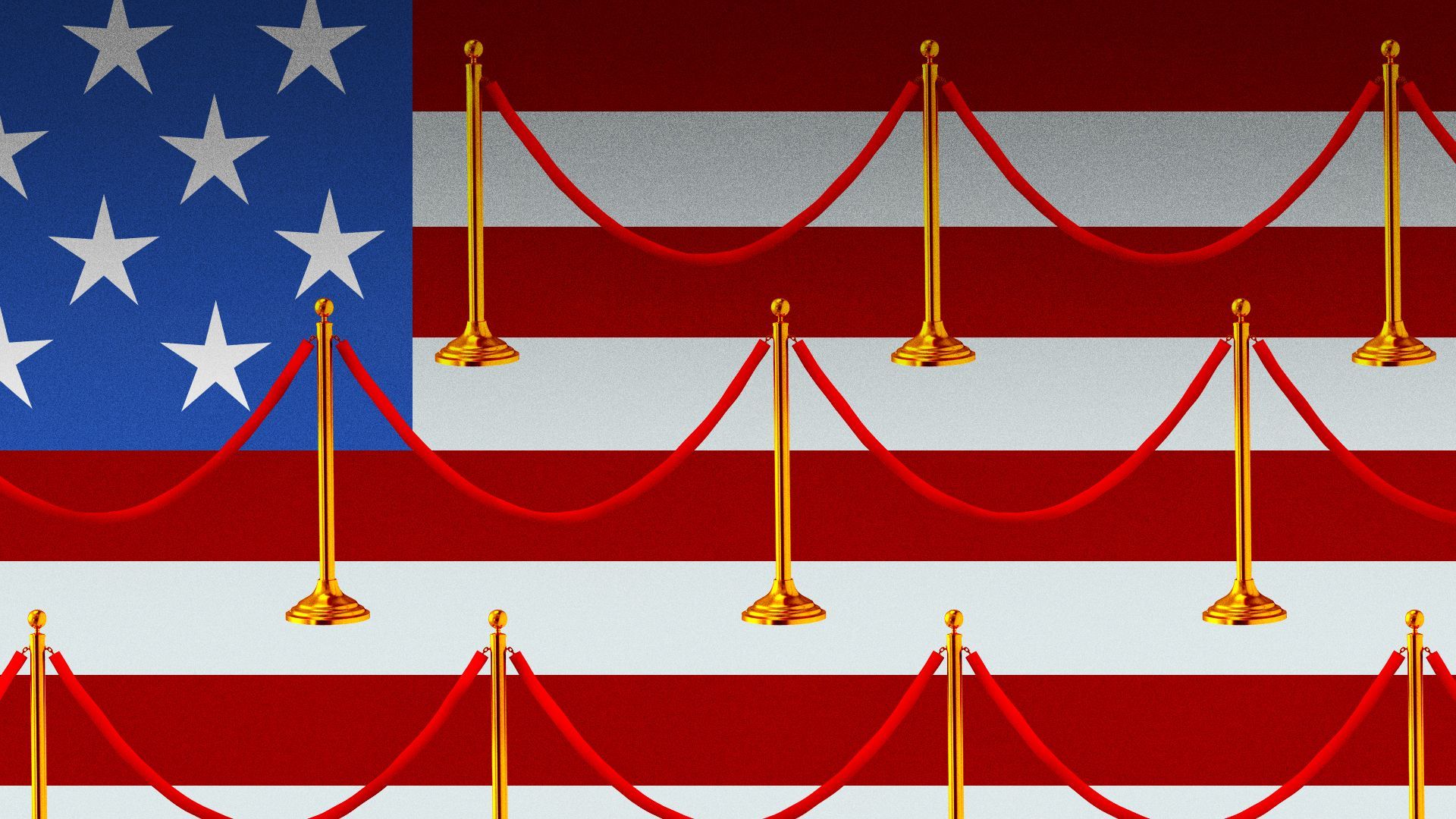Inside Washington's most exclusive club
Add Axios as your preferred source to
see more of our stories on Google.

Illustration: Shoshana Gordon/Axios
White House chief of staff Jeff Zients invited all the former occupants of his office — Democrats and Republicans — to the White House this month for a wide-ranging conversation on the presidency, followed by a casual dinner at his D.C. home, according to participants.
Why it matters: The July 13 meetings gave Zients an opportunity to soak in the collective wisdom of his predecessors, as the White House gears up for a Rose Garden re-election campaign.
- The closed-door sessions evoked an earlier, less partisan time in Washington, when small talk and stiff drinks allowed friendships to flourish and political differences to fade away.
- Most of the counsel — along with praise for keeping the economy humming and resolving the debt ceiling standoff — was centered on how to run the White House effectively, regardless of which party controls it.
- "When we're on the airplane, we all root for the pilot," said one attendee.
Behind the scenes: At dinner, guests were divided into two tables, with Zients presiding over one and his wife, Mary, over the other.
- In all, 12 former chiefs attended: Jack Watson (Carter), Mack McLarty (Clinton), Erskine Bowles (Clinton), John Podesta (Clinton), Andy Card (Bush 43), Josh Bolten (Bush 43), Japan Ambassador Rahm Emanuel (Obama), Bill Daley (Obama), Jack Lew (Obama), Veterans Affairs Secretary Denis McDonough (Obama), Mick Mulvaney (Trump) and Ron Klain (Biden).
- Wives were also invited, but not all of them could make it.
- Samuel Skinner (who served under Bush 41), joined the White House meeting by Zoom but not the dinner due to a COVID exposure.
Zoom in: Zients asked Emanuel at dinner to describe the pros and cons of his old corner office. On one end, there’s a beautiful fireplace, which is warm and welcoming in the winter, Emanuel said.
- On the other end, there’s a patio with a pergola — lovely in the spring and summer.
- The punchline: "Everything in between sucks."
- There were knowing laughs. The position — for all its prestige and power — is brutal on its occupants.
Between the lines: The job is notorious for its long nights and early mornings. Zients, for example, wakes up at 4:30 to meditate.
- Card won the contest for the earliest wake-up routine. He still gets up every morning at 4:08, in honor of Philippians 4:8. The biblical reference sent some guests to their phones for a Google search.
Details: The dress code was casual (Zients told everyone he would be wearing jeans). The wines were South African (where Mary was raised). And dinner was a choice of sea bass or tenderloin (a tasting menu for an upcoming Zients family wedding).
The big picture: The bipartisan gatherings were started by Bolten, George W. Bush's last chief of staff.
- To help make the transition to the Obama White House as smooth as possible, Bolten gathered most of the living ex-chiefs of staff to share their practical advice with Emmanuel, Jonathan Martin scooped in December of 2008.
- Eight years later, McDonough invited Reince Priebus, President Trump’s incoming chief of staff, to lunch with all the formers.
- In the midst of the pandemic — and an election Trump didn’t accept — his team didn't host anything for Klain. But Bolten and McDonough held an independent Zoom for him to keep the tradition alive.
- Early in his tenure, Zients re-established the in-person meeting and hosted everyone at the White House. This July he added a dinner to deepen the relationships and make the gatherings more social.
What we’re hearing: Amid the reminiscing and war stories, there was time for serious advice.
- One practical tip from both Democrats and Republicans: Make sure the president takes debate prep seriously. Presidents tend to think they are prepared. They rarely are.
- The chief of staff has to be prepared to tell the president hard truths, the former occupants told Zients. No exceptions.
- In a presidential re-election, the chief of staff has to establish firm firewalls between the campaign and the West Wing. But at the end of the day, the White House is in charge.
- Take care of yourself on a personal level, Zients was told. And take care of the Cabinet on a political one. Also: protect the president's time.
The bottom line: Dinners like these aren’t going to solve the deep divisions coursing throughout the country and the broader culture.
- But their existence suggests that politics can be transcended in Washington, at least for an evening.
- And for the attendees, there's camaraderie and comfort in belonging to the most exclusive club in Washington — and one that now includes dinner.
